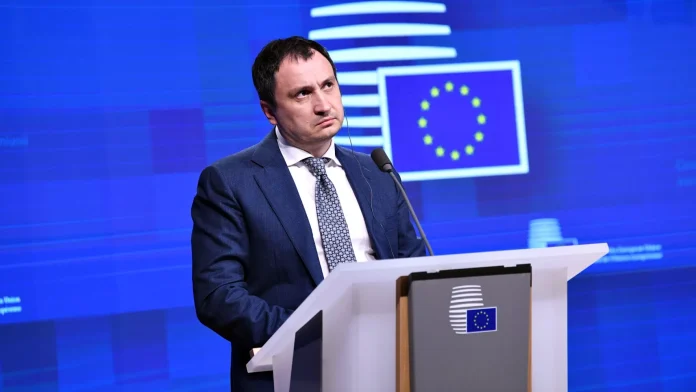EU member states agreed to toughen the free trade rules with Ukraine by expanding the list of “sensitive products” in a compromise reached on Wednesday evening, but Ukraine’s minister of agrarian policy and food, Mykola Solskyi, remarked that “nobody can be fully satisfied” under the current conditions.
“Honestly, of course, we are not fully satisfied. We would like some other conditions for the continuation of this agreement. But at the same time, we want to say ‘thank you’ for these opportunities to trade again. We understand that when you discuss a compromise, nobody can be fully satisfied. So it’s more or less possible to continue trade in such a difficult situation.”
The expanded list of “sensitive products” that may be subject to tariffs now includes poultry, eggs, sugar, oats, maize, groats and honey. The deal enhances supervision of market trends by allowing the use of “remedial measures,” a vague term that allows for national-level bans.
Kyiv is estimated to lose an additional 86 million euros on top of the 240 million euros envisaged in the original proposal due to the amendments proposed. However, Solskyi notes that the news is not so bad.
It’s a compromise between many countries, including my country, Ukraine. All of us understand this is a unique situation because of the war we have at the moment.
Over the past year, the EU has been immersed in a tense debate over Ukrainian agricultural products, which the bloc has exempted from tariffs and quotas to support the country’s war-torn economy. The concessions have drawn fierce criticism from farmers in Poland, Hungary, Slovakia, Romania and Bulgaria. Protesters argue that the goods constitute unfair competition, drive down prices and require too much storage space.
At present, Poland, Hungary and Slovakia have unilateral bans on restricting the flow of Ukrainian grain, despite repeated requests from Brussels and Kyiv. Diplomatic attempts to resolve the year-long dispute have not yet yielded tangible results.
Despite Donald Tusk’s government’s decision to maintain the ban to temper the anger of farmers and truckers, Poland has demonstrated a willingness to reach a lasting solution with Kyiv. The two sides held a high-level meeting on Thursday, which Solskyi described as “serious and honest.”
“Our opinion is that it’s impossible to forbid transit. We understand that there are a lot of emotions around these questions but it’s not time for emotions.”
In his interview, Solskyi expressed confidence that the prolonged tensions in agriculture would be contained in 2024, as Ukrainian companies would gradually return to their “traditional” markets in Asia and Africa and therefore reduce trade with European customers.
We have a war and everything can change. That’s why everybody wants to be very careful with EU rules. But, in my opinion, there is much less risk.
Asked whether European solidarity with Ukraine would decrease or increase in the coming months, Solsky replied, “I hope that it’s at least the same.”
